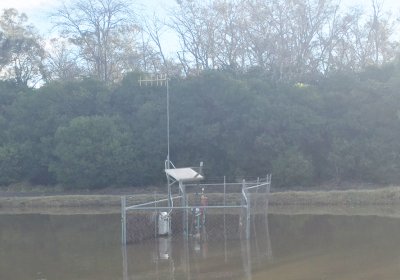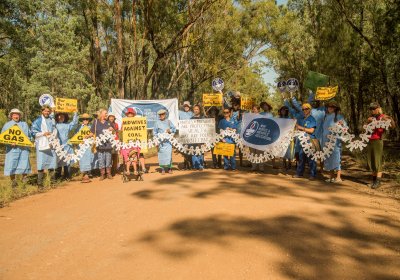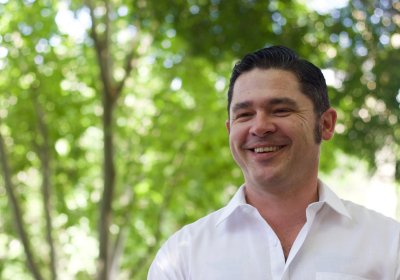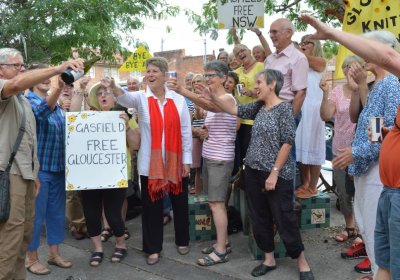AGL CEO Andrew Vesey likes to paint himself as a sort of “greenie” who is shifting the company in the right direction in these “carbon constrained” times.
Coal seam gas (CSG)
As AGL announced a $400 million loss on August 10, anti-gas protesters assembled outside its headquarters to demand it close its Camden coal seam gas (CSG) project in south-west Sydney.
AGL's Camden Gas Project, in the Macarthur region of south-west Sydney, has 144 coal seam gas (CSG) wells, of which 96 are currently in production. Twenty of the wells are close to the Nepean River and the upper canal, which carries drinking water from Nepean Dam to Prospect Reservoir. One well is just 40 metres from the river. AGL's CSG mining alongside the Nepean River risks contaminating this water with carcinogenic chemicals and volatile organic compounds.
Senator Glenn Lazarus’s 117-page interim Senate report on unconventional gas mining in Australia was released on May 4. It makes a case for much tighter federal control of the industry and the public resources it has access to, but does not recommend its closure.
If anything the report underscores the need for a royal commission into the toxic industry that relies on commercial in confidence provisions to get away with poisoning people and the environment.
We arrived at twilight and put up our tents using the headlights from the car. A young man at the camp helped us with threading those damned rods with elastic bits through the tape slots on the tent. We had just got it up when we heard a bell ring for the evening meal. The meal was delicious, catering for both vegetarians and meat eaters.
Activists from Stop CSG Sydney and the Australian Student Environment Network toured the AGL Camden CSG gasfields on April 17 to see for themselves how close gas wells are to homes. AGL has promised to end gas mining in Camden by 2023. Residents want them shut down now.
The NSW government has said that gas wells cannot be drilled within two kilometres of homes, but it is happy for Landcom, the government's own developer, to sell house and land packages within a few hundred metres of major gasfields.
The Illawarra Knitting Nannas Against Gas (I KNAG), held a "knit-in", in Edgecliff in Sydney, at the office of Prime Minister Malcolm Turnbull on March 21.
He was not there and had not answered the two simple questions the Nannas had left him earlier. “Do you support a ban on coal seam gas (CSG) mining in drinking water catchments?" and “Would you move federal legislation to enact a ban on CSG mining in drinking water catchments?”
Anti-coal seam gas (CSG) activists took direct action on March 2 to prevent Transpacific Waste Water from accepting waste water from AGL's coal seam gas operations in Camden.
Members of the Knitting Nannas Against AGL, CSG Free Western Sydney, Stop CSG Sydney, Stop CSG Penrith, Stop CSG Camden, Stop CSG Blue Mountains and Stop CSG Hawkesbury showed their concern about Transpacific's handling of AGL’s waste water by blockading their trucks.
In the Pilliga Aboriginal land rights, water supply, farming, local economies, world-leading astronomy research, the night sky, biodiversity and endangered species such as koalas are all under threat.
Jim Casey, until recently the secretary of the Fire Brigade Employees Union in NSW, has been preselected for the Greens candidate in the seat of Grayndler in Sydney. I interviewed Casey for Green Left Radio on February 5.
* * *
Last week Anthony Albanese, who is the Labor MP for Grayndler, lambasted you for being a socialist.
 Five climate guardian angels were arrested by police on February 9 while blockading the road to Santos' Leewood wastewater facility in the Pilliga forest near Narrabri in north-west New South Wales.
Five climate guardian angels were arrested by police on February 9 while blockading the road to Santos' Leewood wastewater facility in the Pilliga forest near Narrabri in north-west New South Wales.
“Coal seam gas in New South Wales is dead in the water”, Julie Lyford, spokesperson for Groundswell Gloucester, said after AGL announced on February 4 it was quitting Gloucester.
AGL had planned to drill at 300 sites in a geologically complex and rich farming region north-west of Newcastle. It had been facing fierce opposition for conducting tests in the Gloucester region under PEL 285.
The decision has been welcomed by anti-coal seam gas (CSG) campaigners across NSW. AGL's licence was due for renewal on February 22.
- Previous page
- Page 6
- Next page










